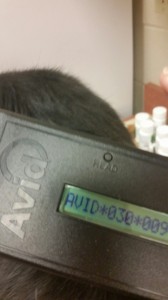Microchip Identification for your Pet, upcoming events
Pet Identification Microchip Q and A’s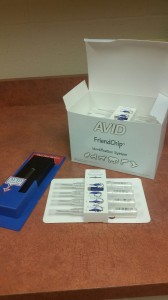
Why should my pet have a microchip? If your pet ever goes outdoors or travels, or if there is a possibility it could accidentally slip out a door or under the fence (and isn’t that most pets?), there is a chance it could get lost. Hunting dogs, show dogs, dogs boarded at kennels, and escape artists are particularly at risk. An implanted microchip is a way to make sure there is a way to help anyone who finds your pet locate you and return your pet. Many shelters improperly identify the breed of a pet, or someone may just find your pet and take it to a vet intending to keep it. If the pet is scanned for a chip, and you have kept up your registration, you can be reunited with your pet.
How is the microchip implanted? Does my pet need surgery? Does it hurt? The chip is inserted under the skin above your pet’s shoulders using a hypodermic needle very much like the one used to vaccinate, only larger in diameter. No anesthetic or sedation is needed, although many pets have the microchip implanted during other procedures so they don’t feel it. The only pain felt is that of the needle insertion, which is minor but since it is a relatively large needle, some pets may yelp or otherwise indicate a moment of discomfort. The chip itself is painless.
What are the ste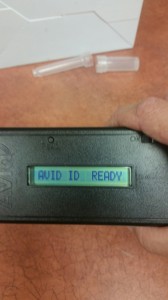 ps involved and how does it identify my pet? As shown in the pictures, before implantation the chip is checked to make sure the number matches that on the label and that it is functioning so the reader can detect it. The pet’s skin is prepared with alcohol or other cleanser, and the needle is inserted much like a vaccination would be. The plunger places the chip into the loose tissue under the skin above the shoulders. We then check again to make sure the reader can find the chip and again verify the number. After that, you as the pet owner will go online to register your pet with your contact information, your vet’s contact information, and any pertinent details about your pet like breed, sex, color, and any significant health concerns. It is up to you to register your pet with the company, pay the fee, and keep the company up to date on any changes in your contact information.
ps involved and how does it identify my pet? As shown in the pictures, before implantation the chip is checked to make sure the number matches that on the label and that it is functioning so the reader can detect it. The pet’s skin is prepared with alcohol or other cleanser, and the needle is inserted much like a vaccination would be. The plunger places the chip into the loose tissue under the skin above the shoulders. We then check again to make sure the reader can find the chip and again verify the number. After that, you as the pet owner will go online to register your pet with your contact information, your vet’s contact information, and any pertinent details about your pet like breed, sex, color, and any significant health concerns. It is up to you to register your pet with the company, pay the fee, and keep the company up to date on any changes in your contact information.
There seem to
be lots of different companies with chips. What is the difference? Probably the most important thing to check is whether the company maintains a life-long registry. Many cheaper brands do not, thus losing the benefits of being able to contact you if your pet is found. Some even state in their materials that they do not guarantee records of chip numbers. Another concern is that not all readers can detect or read the numbers on all chips. We recommend you choose a major company that can at least detect what type of chip is implanted, and that guarantees a life-long registry of your pet with one fee. Companies which are considered reliable with registration currently include Datamars/PetLink, Home Again, AKC Reunite, AVID (the one we use), and 24 PetWatch. You should also look for a company that pro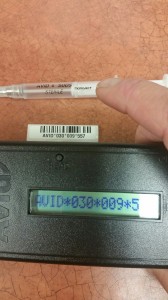 vides a tag for your pet’s collar, which can help finders know to look for a chip assuming the collar or tag have not been lost.
vides a tag for your pet’s collar, which can help finders know to look for a chip assuming the collar or tag have not been lost.
What about tags or tattoos? We do recommend your pet wear a collar with ID tag as well, even if they are micro-chipped. If your chip comes with a tag, the presence of that tag can let finders know that chip ID can help them locate you. But a tag is only good if the address is current and your pet hasn’t lost their tags or collar. Tattoos can also be used as identification, but with the exception of a few specific registries like racing greyhounds, there is no nation-wide registry for them. They can be helpful as an identification marker, to prove it is your dog, however, and this is why many show dogs have them. They can also be hard to read.
In short, we recommend every pet have a form of ID. Without it, finding a lost pet can be very difficult. Just like medical insurance, we hope your pet’s microchip will never be needed. But we think you should consider one for your peace of mind.
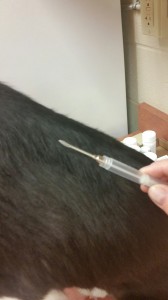 Upcoming Events:
Upcoming Events:
Canine Massage Appointments: Friday, June 26. Call 816-331-1868 to schedule your pet’s appointment.
July 3-4—closed for the holiday.
July 11, 3-5 p.m.—Seminar for licensed veterinarians only. The Science and Theory of Complementary and Alternative Veterinary Therapies. We invite you to mention this to your vet to encourage them to come learn about the special therapies we offer and how referring for these treatments can help them help your pet. 2 hours of continuing education credits for vets, free.